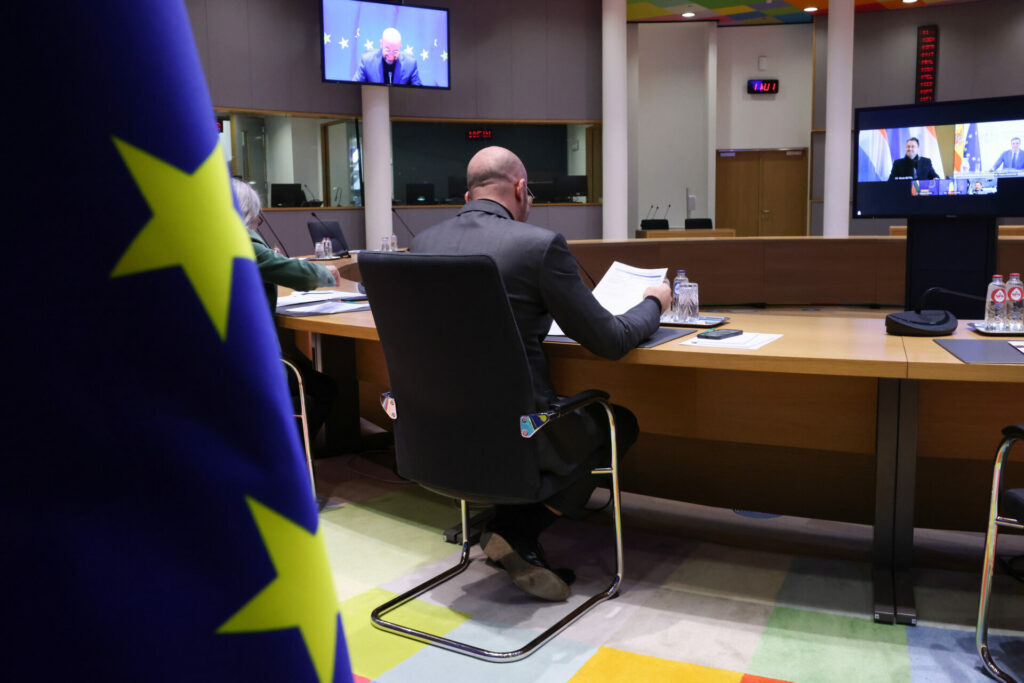The current migration situation has been deemed a "European challenge that requires a European response" by the 27 leaders of EU countries who met in Brussels on Thursday. Leaders came to a consensus on other tough provisions, some of which are highly controversial.
The conclusions of the summit indicate the 27 EU countries agreed on several tactics to curb "irregular immigration", including the more controversial proposals to construct walls and fences to reinforce borders (using EU funding) and linking development aid to cooperation with migrant return policies.
Against the backdrop of irregular border crossings reaching their highest level since 2015, the argument that EU external borders should be even more closely guarded – in order to discourage migrants from entering Europe irregularly – was met with broad approval.
On Friday morning, Belgian Prime Minister Alexander De Croo said on Radio 1 that the approach agreed upon, including "stepping up surveillance of Europe's external borders" is "not a tough approach, but it is a correct approach," adding that the situation in several countries, including in Belgium, is "not sustainable," and that there is "too much uncontrolled migration."
Strengthening fortress Europe
Several countries, including those with a history of harsh migration rhetorics such as Hungary, Bulgaria, Greece and Austria, called on the European Commission to immediately mobilise "substantial EU funds and means to support Member States in reinforcing border protection capabilities and infrastructure, means of surveillance, including aerial surveillance, and equipment."
While the controversial construction of walls or fences is not explicitly mentioned in the summit's conclusions, it can be interpreted as such, especially in light of Hungarian Prime Minister Viktor Orban's reference to the ongoing construction of a two-metre high fence on the border with Serbia, which he "wants to turn into a five-metre high fence with European money."
While this type of infrastructure did result in arrivals dropping during the asylum crisis in 2015, proportionally, it resulted in more people dying, as walls and fences tend to only divert migration to more dangerous routes (often to maritime routes), without tackling the underlying reasons for migratory pressures.
EU Commission President Ursula von der Leyen said in response to this call that a fence alone will not work. "A lot of other infrastructure is needed around that, such as watchtowers, vehicles, trained personnel, roads.... Our focus is on functioning borders so that procedures are the same across Europe."
Related News
- Build that wall: Controversial EU border fences to be discussed in migration summit
- European countries press for tougher management of irregular arrivals
Belgium's State Secretary for Migration and Asylum Nicole de Moor was also in favour of this measure — referring to a "fence with a door" — however, De Croo didn't comment on this during the meeting as it did not gain unanimous support from other parties in the Vivaldi government (the Flemish Green Party called the solution "both nonsensical and unjust").
He argued on Friday morning that those external borders shouldn't necessarily be guarded with fences or walls and that the idea is "not to create a Fortress Europe," but to combine infrastructure, technology and people" to ensure that the fence has a door for "people who are entitled to protection" and a door for people who don't.
Meanwhile, the EU leaders did agree that "they will respect international law and fundamental rights at all times when protecting their external borders," however, several reports have shown this is already not the case, as there are numerous examples of systematic violations taking place here.
NGO Amnesty International addressed a letter ahead of the summit referring to examples of countries derogating from asylum laws for the purpose of dealing with migrants and asylum seekers "who are being used for political purposes: arbitrary detention, denial of asylum, unlawful returns, violent pushbacks and other inhuman and degrading treatment, in some cases even amounting to torture."
Returns and Dublin procedure
Another controversial conclusion made by EU leaders included the use of development aid as a tool to curb migration by effectively returning migrants to their countries of origin, "using as leverage all relevant EU policies, instruments and tools, including diplomacy, development, trade and visas, as well as opportunities for legal migration."
While the right to link foreign aid to migration cooperation has already existed for more than two decades, it has never been used. The conclusion also included a mention of the new European Pact on Asylum and Migration, which is stated should be completely finalised by spring 2024, as was called for by de Moor, who stressed that until it comes into force, the Dublin procedure must be respected.
Tweet translation: "The European Council on migration is over. Positive that leaders have the ambition to realise the EU Migration Pact in 2024, that the importance of Dublin rules is recognised and commitments are taken around better control of external borders. European reforms and solidarity are fundamental for our country."
This also was discussed during the EU meeting and was cemented in the conclusions. The procedure stipulates that the EU Member State where the person in question entered Europe is responsible for the asylum application. However, many have argued for a reform of the Dublin regulation, as it places an unfair pressure on EU's southern Member States.
"The main lesson of this night's decision is that no country can cope alone. We can only cope if European countries work together and that will has now been confirmed," De Croo noted.

